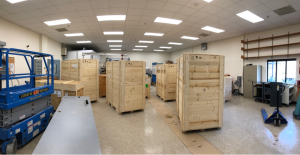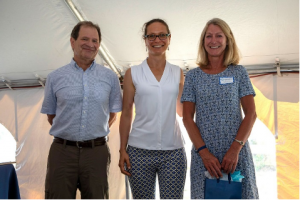News
January 2026 Newsletter
Ever wonder what happens to samples before they’re analyzed? At NOSAMS, organic carbon samples are carefully pre-treated using either acid-base-acid (ABA) methods or acid leaching to ensure accurate results. For select samples, we use our automated OCtoPuS — the Organic Carbon Pretreatment System. Curious to see how it works? Watch OCtoPuS in action in this…
Read MoreDecember 2025 Newsletter
Highlights from the Recent Literature Barry, P.H. et al. (2025) Carbon, nitrogen, and noble gas isotopes reveal deep volatile signatures in thermal springs in the Central Volcanic Zone (CVZ) of the Andes. Earth Planet Sci. Lett. 651: 11969. https://doi.org/10.1016/j.epsl.2024.119169 Lee, S.C et al., (2025) Sediments near industrial ports can be hotspots of fossil carbon accumulation.…
Read MoreNovember 2025 Newsletter
Sue Handwork, Al Gagnon retiring After a combined 83 years of service, NOSAMS administrator Sue Handwork and prep lab manager Al Gagnon are concluding their distinguished careers at NOSAMS. Al retired earlier this year, and Sue will soon follow. Over the years, many of you have shared how Al and Sue have shaped your experiences at…
Read MoreOctober 2025 Newsletter
NOSAMS leading 14C-DIC interlaboratory comparison Internationally recognized standard material does not exist for the 14C analysis of dissolved inorganic carbon (DIC), creating challenges for laboratories seeking to carry out this analysis. NOSAMS is leading an effort to carry out the first 14C-DIC interlaboratory comparison. The exercise will include surface and deep (2200 m) seawater collected…
Read MoreNOSAMS Seawater 14C-DIC Inter-laboratory Comparison
NOSAMS is organizing an inter-laboratory comparison for seawater 14C-DIC. The exercise will include surface and deep (2200 m) seawater collected from Station ALOHA located in the North Pacific subtropical gyre. To participate, please fill out and submit this form. Information marked with an asterisk (*) is required. The deadline for registration is November 1, 2025. We…
Read MoreDecember 2024 Newsletter
Happy Holidays from NOSAMS The past six months have been very busy at the NOSAMS facility. In September we hosted a MICADAS workshop that brought together 42 people from 18 international institutions at WHOI, plus an additional 38 online participants. Mark Roberts has recently retired after 22+ productive years as Staff Physicist with the facility.…
Read MoreAugust 2023 Newsletter
New GO-SHIP samples have arrived NOSAMS was founded in part to spearhead the analysis of Δ14C dissolved inorganic carbon (DIC) from repeat hydrography cruises. The data are deposited into the publicly accessible database CCHDO (CLIVAR and Carbon Hydrographic Data Office). Samples have just arrived from the recently completed Global Ocean Ship-based Hydrographic Investigations Program (GO-SHIP)…
Read MoreAugust 2022 Newsletter
Dear Friends of NOSAMS, These past few months have been a productive time at NOSAMS and we are writing to update you on recent changes. We are excited to announce that we have purchased a new MIni CArbon DAting System (MICADAS), manufactured by IonPlus, with funds from a successful NSF MRI proposal and WHOI cost…
Read MoreMICADAS
We are excited to announce that we have purchased a new MIni CArbon DAting System (MICADAS), manufactured by IonPlus, with funds from a successful NSF MRI proposal and WHOI cost sharing. It was installed in April, 2022 and passed final site acceptance tests in July, 2022. Samples can now be introduced as graphite or via…
Read MoreStaff Recognition
Sue Handwork was recently recognized at the WHOI Employee Appreciation Celebration for her 40 years of service, of which 28 have been at NOSAMS. Also recognized were Mark Roberts (20 years), Mary Lardie Gaylord (20 years) and Kalina Gospodinova (10 years). Congratulations and thank you to all of these hard working, long serving NOSAMS staff.
Read More

